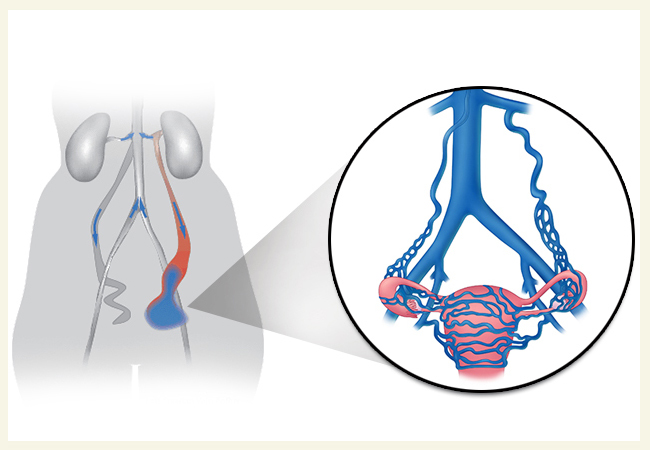

PELVIC CONGESTION SYNDROME
it is a chronic pain influenced by standing or sexual intercourse in women who have varicose veins in or near the ovaries.
Pelvic congestion syndrome is a common cause of chronic pelvic pain. Varicose veins and venous insufficiency are common in the ovarian veins but are often asymptomatic. Why some women develop symptoms is unknown. Most women with pelvic congestion syndrome are aged 20 to 45 years and have had multiple pregnancies.
SYMPTOMS AND SIGNS OF PELVIC CONGESTION SYNDROME
In women with pelvic congestion syndrome, pelvic pain develops after pregnancy. Pain tends to worsen with each subsequent pregnancy.
Typically, the pain is a dull ache, but it may be sharp or throbbing. It is worse at the end of the day (after women have been sitting or standing a long time) and is relieved by lying down. The pain is also worse during or after sexual intercourse. It is often accompanied by low back pain, aches in the legs, and sometimes abnormal menstrual bleeding.
Women may also have varicose veins in the buttocks, thighs and vagina.
Some women occasionally experience a clear or watery discharge from the vagina.
Other symptoms may include fatigue, mood swings, headaches, and abdominal bloating.
Pelvic examination detects tender ovaries and cervical motion tenderness.
TREATMENT OF PELVIC CONGESTION SYNDROME
Medroxyprogesterone acetate, nonsteroidal anti-inflammatory drugs (NSAIDs), and gonadotrophin-releasing hormone (GnRH) agonists
Treatment of pelvic congestion syndrome includes high-dose medroxyprogesterone acetate, NSAIDs, and GnRH agonists. If these drugs are ineffective and the pain persists and is severe, embolization or sclerotherapy may be considered.
Varicosities detected during venography may be embolized with small coils or an embolic agent after local anesthesia and IV sedation are used. This procedure reduces the need for analgesics by up to 80%.
HOMOEOPATHIC APPROACH WITH MEDICINES FOR TREATING THE SYNDROME
1) Aesculus hip:- it works on the back and area of lower bowel. It helps in reducing pelvic pain caused due to bruises in pelvic region.
2) Sabina officinalis:- it is a good remedy for pelvic congestion and other pelvic inflammatory disorders with heavy menstruation. The periods are profuse and gushing in nature. Pain in Sacrum extending back to the pubes is a primary accompanying symptom.
3) Palladium:- This homoeopathic remedy is very beneficial in reducing and enduring pain and swelling in right ovary of patients suffering from Pelvic Inflammatory diseases. It also helps in lessening the soreness from naval to the pelvis.
4) Pulsatilla:- this Homoeopathic medicine is greatly recommended for women who develop varicose veins during the course of their pregnancy. It especially acts on the swollen veins of the hands and legs.
5) Hamamelis:- it is known to be a homoeopathic remedy for varicose veins. It effectively stops any form of BLEEDING from the veins. It also offers relief from pain and a sensation of heaviness of legs.
6) Arnica Montana: - it effectively deals with the varicose veins accompanied by symptoms like soreness and bruising